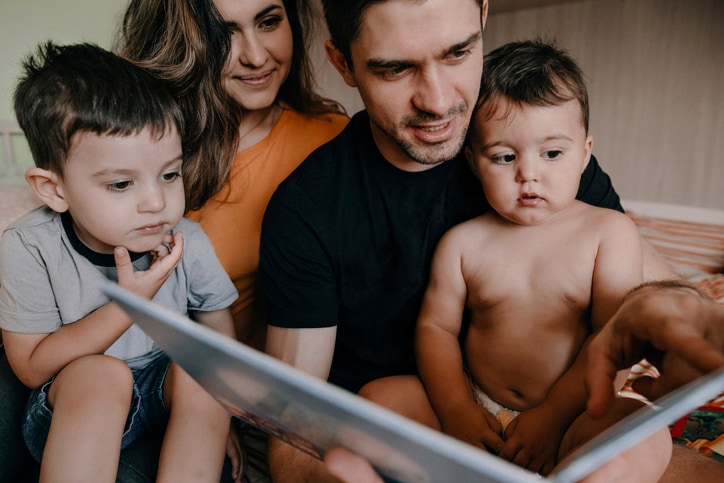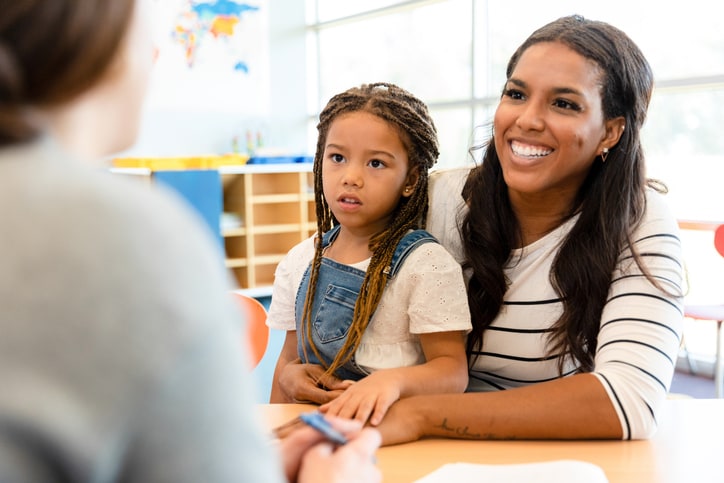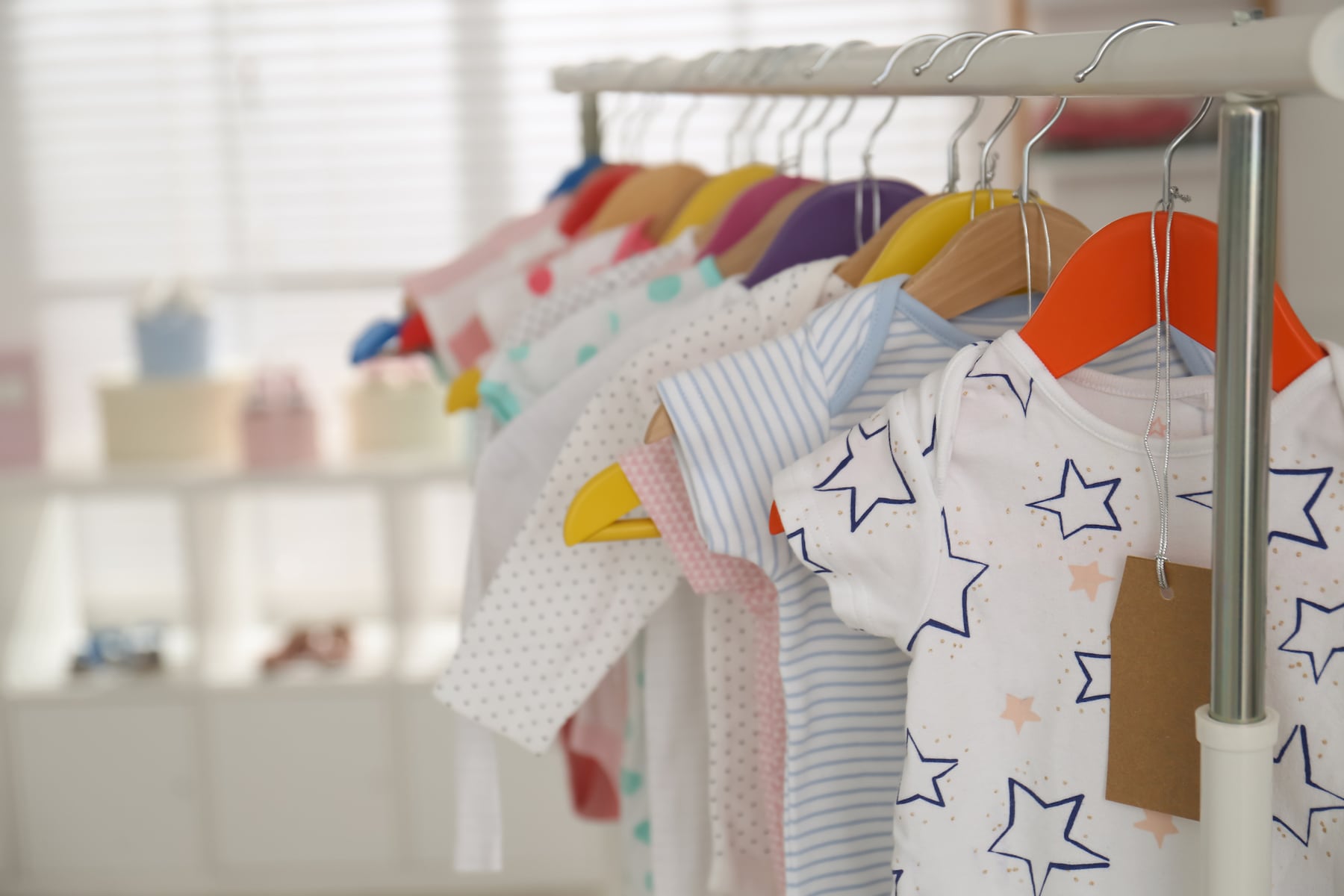With the rise in popularity of language learning apps, many parents are finding themselves studying a second language right along with their school-aged kids these days. In fact, at the start of 2023, 30% of adults said they were planning to learn to speak a new language. But who has a better chance at success: kids, teens or adults?
“It gets more difficult to learn languages in a native-like way as one approaches puberty and thereafter, with individual variation, of course,” explains Erika S. Levy who holds her doctorate in speech and hearing sciences and is the director of the speech production and perception lab at Teachers College, Columbia University. “This seems to be due to a combination of wiring for language learning early on and the increasing effect of the first language on the second language as the first language becomes increasingly solidified.”
So what’s the best age to learn a new language? The earlier the better, according to psychology and education experts. Here, they shed light on the latest research, plus the benefits of teaching kids a second language in early childhood.
What’s the best age to learn a new language?
Experts agree there is a clearly defined “critical period” for language acquisition or a period of life when it is easiest to learn a language. According to the latest critical period hypothesis research, this period extends from birth until age 18, which is longer than previously thought. However, it is best for kids to start learning a language by age 10 if parents want them to achieve the fluency of a native speaker — and the sooner they start, the better their chances.
“Children learn languages, especially pronunciation, more effectively and efficiently if they learn them early,” says Levy. “Plus, learning a language early opens up communication with others, different worlds and cultures and ways of thinking, and the realization that there’s not just one way to speak or to live or to think.”
At one point, there was a fear that exposing infants and toddlers to more than one language could delay speech development. But that’s proven to be a myth, according to the American Academy of Pediatrics (AAP). In fact, most bilingual children speak their first words by age 1 and use two-word phrases by age 2, which are the same developmental milestones for children who learn only one language, they explain.
Levy, who is also a trilingual speech-language pathologist, adds that learning a second language also does not increase the likelihood of developing a language disorder. Kids who have language disorders, as well as those who do not, borrow from one language to another while picking up their second language, she says, pointing out that more than 40% of the world is bilingual.
“Children learn languages, especially pronunciation, more effectively and efficiently if they learn them early. Plus, learning a language early opens up communication with others, different worlds and cultures and ways of thinking, and the realization that there’s not just one way to speak or to live or to think.”
—Erika S. Levy, director of the speech production and perception lab at Teachers College, Columbia University
Why it’s easier for young children to learn a new language
“There are many reasons children might have an advantage for learning a second language,” says Erin E. Hannon who holds her doctorate in human experimental psychology and specializes in auditory cognitive development and language acquisition as a professor at University of Nevada, Las Vegas. A few to bear in mind:
Native-language interference
Native-language interference is the impact of a child’s native language on speech and language processing. “The younger you are when you acquire a second language, the less it will interfere with your native language,” Hannon says.
Immersive learning environments
There are also contextual factors that may make it easier for children to learn a second language, especially when they are immigrating to a new country. “Immersion and the need to communicate seem to be very important in second-language learning,” Levy adds. “So whereas worksheets might help us with linguistic concepts, the back and forth and real-world experience of communication is the best teacher.” This is where children have the leg up on adults.
Natural motivation
“Children are immersed in the second language at school,” Hannon says. “They want to make friends so they are highly motivated to learn the language quickly and they have many opportunities to practice the second language.” By contrast, adults are often less likely to be in highly immersive environments when acquiring a second language and have that level of motivation.
The benefits of starting to learn a second language in early childhood
There are many benefits of starting language instruction between the ages of 2-5, many of which McKenna Hoover, a preschool French teacher based in Charleston, South Carolina, has seen play out firsthand in her classrooms.
Development of a more native accent
“In early childhood, kids are learning their own English phonemes – which are distinct sounds of letters – so their brains are really open,” explains Hoover who has taught French to both teens and toddlers during the course of her career. “French in particular has a lot of different phonemes that English doesn’t have, so when both their brains and their muscles can get used to different sounds very early, it sets a strong foundation for a better accent later on.”
Ease of learning
The standard for most language instruction at any age in schools is to aim to have class be at least 90% led in the target language, Hoover explains. However, immersion techniques like this may be more effective in early childhood due to the natural confidence children have to speak words they don’t know. This is a big benefit that can make learning easier, she says.
“In my middle school and high school students, there was an acknowledgement that they didn’t know what I was saying, so for some, it was so hard for them to feel comfortable speaking French because they worried they would be judged,” Hoover says. “Whereas with the littles, they don’t necessarily always know what you’re saying to them in English, so it’s not really any different. They know French words aren’t words they are used to, but they repeat them without fear of sounding correct.”
Quick tips for getting your child started with a second language
Choosing a language that your little one will be exposed to as much as possible in early childhood is the best way to set them up for success, explains Levy. “When the child is surrounded by a language and needs to use it to communicate, and enjoys their experience with it, they will be more likely to learn and maintain it,” she says. That said, parents would do well to opt for a language their child has access to in their daily life, whether it’s offered at a school that offers second-language instruction or in the care of a bilingual babysitter or nanny, notes Levy.
At home, she encourages parents to use the language as much as possible rather than relying on videos or shows. For parents getting started, one resource she recommends is “A Parents’ and Teachers’ Guide to Bilingualism,” which provides advice on how to raise bilingual kids.
The bottom line
The best age to start learning a new language is during the first years of life. However, it’s still possible for kids to effectively learn a language well into their teenage years so parents shouldn’t be discouraged if their child gets a later start. As Levy concludes, “We can continue to learn speech sounds, grammar and words later, but we are wired to learn language, and especially speech sounds, most effectively early on.”





